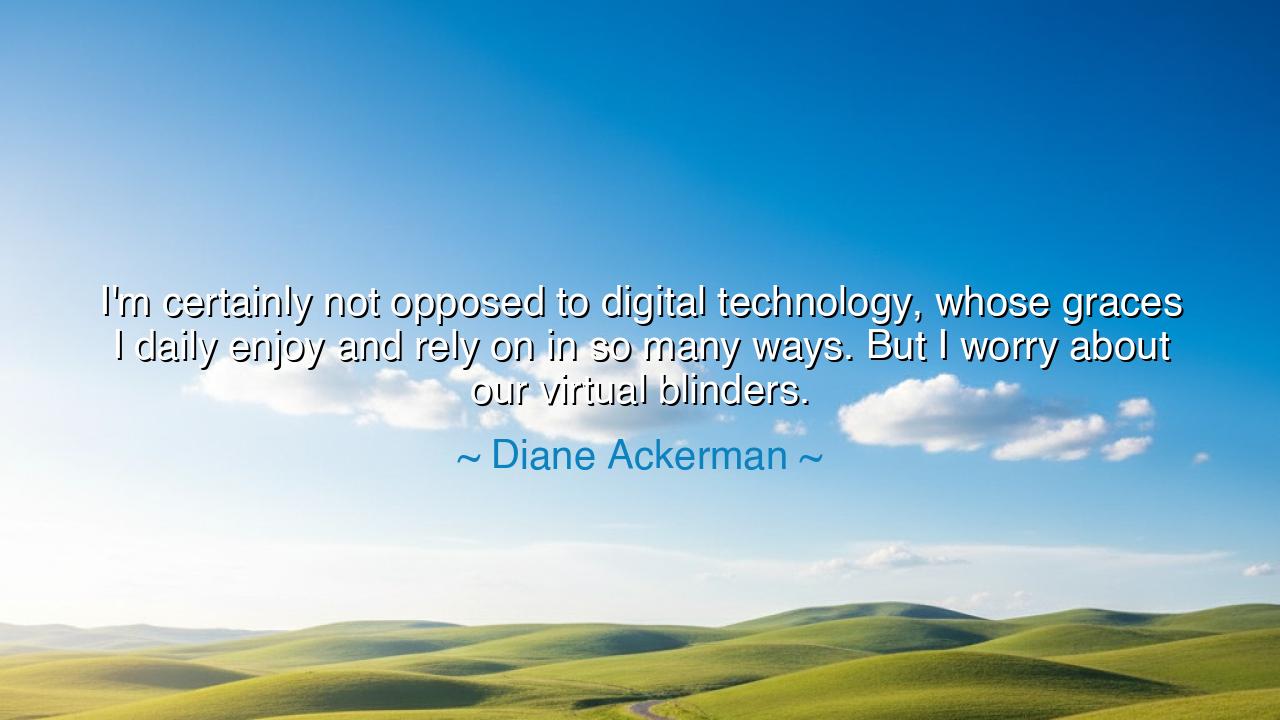
I'm certainly not opposed to digital technology, whose graces I
I'm certainly not opposed to digital technology, whose graces I daily enjoy and rely on in so many ways. But I worry about our virtual blinders.






Hear, O seekers of wisdom in this age of wires and light, the voice of Diane Ackerman, who hath said: “I’m certainly not opposed to digital technology, whose graces I daily enjoy and rely on in so many ways. But I worry about our virtual blinders.” These words are a balance of gratitude and warning. For she doth not despise the gifts of the new age—indeed, she delights in them—but she seeth the hidden peril: that while technology openeth doors, it may also narrow the vision of the soul, binding the eyes to screens while the greater world fades from view.
Mark well this truth: every age hath its wonders, and each wonder carrieth with it both blessing and burden. The printing press spread knowledge across the earth, yet it also spread lies and propaganda. The television brought images into every home, yet it also dulled many into passivity. So too with digital technology—it bringeth communication, speed, and abundance, but it also tempteth men and women to wear virtual blinders, seeing only what algorithms feed them, forgetting the vastness beyond the screen.
Consider the tale of Narcissus of old, who bent over the still water and became entranced by his reflection. Though the pond was but a fragment of the world, he saw nothing else, and so he withered. Is this not akin to the peril Ackerman describeth? Many gaze into the glowing pools of their devices, entranced by images, forgetting the forests, the skies, the faces of those beside them. The reflection they see is curated and narrow, but the cost is blindness to the larger truth.
Yet, let it not be said that Ackerman condemneth all. Nay, she confesseth her own reliance, her own joy in the graces of technology. For indeed, the digital realm alloweth us to speak across oceans, to learn without end, to preserve knowledge beyond parchment. This is no curse in itself. But as fire can warm or burn, so too can technology enlighten or obscure. The peril lies not in the tool, but in how mankind useth it.
Mark also the tale of the explorers who set forth across the seas in the fifteenth century. They relied on compass and map, gifts of technology that guided their way. But had they trusted blindly in instruments alone, ignoring the stars and the winds, they would have perished. So it is with us: we must use our devices as guides, but not allow them to become our sole vision. For virtual blinders narrow the soul, while true wisdom keepeth the eyes wide, balancing the seen and the unseen, the digital and the real.
The lesson is clear: embrace digital technology, but guard against blindness. Let not thy days be consumed entirely by screens. Step outside, breathe the air, touch the earth, speak face to face with thy fellows. For to live only in the digital realm is to become like a horse with blinders, seeing only the narrow path set before it, while the vast meadow lies unseen at its side. Patience, presence, and balance are the antidotes to narrow vision.
Practical is this counsel: set times when thou puttest aside devices, to dwell in silence, in nature, or in fellowship with others. Question what thou seest online, and seek voices beyond the narrow corridors of thy feed. Let technology serve thee, not enslave thee. And when thou usest it, use it with intention: to learn, to connect, to build, not merely to numb thy spirit.
Thus remember Ackerman’s words: “I worry about our virtual blinders.” This is no rejection of progress, but a plea for vigilance. For the danger of the age is not that we have too much knowledge, but that we see too little of the world beyond our chosen window. Remove the blinders, O children of tomorrow, and look upon the fullness of life. For only then will technology truly be a grace, and not a chain.






AAdministratorAdministrator
Welcome, honored guests. Please leave a comment, we will respond soon